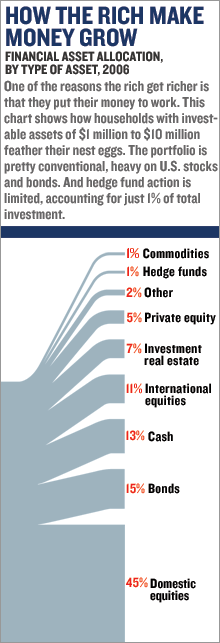Why the wealthy avoid high riskHedge funds have their place, but America's richest embrace a cautious, diversified approach to investing. Fortune's Katie Benner opens up the wallets of the wealthy.NEW YORK (Fortune) -- Some CNNMoney readers were surprised by a Northern Trust survey that said the richest Americans do not heavily rely on high-risk investment vehicles like hedge funds to make money, but are moderate risk takers who put more than half of their asset allocation into U.S. stocks and cash. But advisors who work with affluent investors say the findings make sense, and offered some strategies for navigating the market like a millionaire.  "For the most part, our investors are more concerned with wealth preservation and strategic growth, rather than trying to hit a home run," says Peter Hill, chief investment officer at Bailard Capital, an investment firm that works with high-net-worth individuals and institutional investors. "Generally they want to see prudently managed growth without a lot of surprises, which is why we emphasize diversification." Much like the investors surveyed by Northern Trust, Hill's firm is optimistic about the global economic outlook. He recommends a typical asset allocation of 15 percent real estate, 15 percent international equities, 10 percent alternative assets, 10 percent in bonds and 50 percent U.S. stocks. He adds that investors should diversify their U.S. equity holdings across the spectrum of risk: growth, small cap value and core and blue chip holdings. "Small cap value has been a great performer, and we even have a small portion of our portfolio devoted to microcaps," says Hill. "We're always in pursuit of a perfect portfolio, and that's a portfolio that runs like a luxury car once all the pieces are in place. You can't have turbo without anti-lock brakes. You can't have money in microcaps without having a bond strategy or a real estate strategy." Managers and investors are, for the most part, bullish on equities, but they recognize that after several years of positive returns for overseas and domestic stocks, the low-hanging fruit may be gone. "We will have to work a little harder to find good buys, but there are a lot of companies out there languishing," Hill says. "Healthcare and tech have lagged relative to other sectors, and we're going there for diamonds in the rough. We also believe tech and large, growth stocks will make a comeback this year." As for more esoteric investments like hedge funds, they can serve an investor well as a diversification tool, says Jonathan Lewis, a principal at the fixed-income investment manager Samson Capital Advisors. But buyer beware. "There are a number of absolute-return oriented hedge funds that people may be gravitating toward in this environment, but for the most part these returns are dominated income events and short-term trading. The returns are also entirely taxable," he says. Lewis has found that municipals and tax-efficient strategies in investment grade fixed income can be competitive with some alternative investments on a total return basis. They are also more transparent and don't carry the onerous fees of a hedge fund. Samson's client base - affluent families, foundations, endowments and corporations - are also using multi-currency strategies. "Our clients are concerned with wealth preservation and, because they're citizens of the world, purchasing power protection," Lewis says. "A well-managed currency strategy plays an important role in these goals and can hedge against volatility and the long-term decline of the dollar that is a concern for many." Not only do wealthy investors have diversified portfolios, it's not unusual for them to work with more than one money manager, a practice Lewis says his firm encourages. "At any given point in time, certain asset classes are doing better than others. Our clients have a number of people working with them so they have a good diversity of strategies and managers to come up with the right solution for different situations." Millionaire investors and their wealth managers agree that the current investment environment is one characterized by exuberant markets against the backdrop of a grim geopolitical picture. "Clearly there are some very major risks out there - the risk that war in the Middle East will expand and a major oil disruption will shake the global economy; the risk that China or India could implode. These risks are much more significant than a policy mistake that brings interest rates too high," says Hill. "But we can't simply live in fear of it all. We just have to be very diversified so that we can win whether the markets go up or down." |
Sponsors
| ||||||||||
